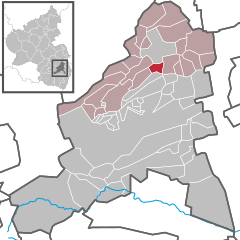Kleinkarlbach
| Kleinkarlbach | ||
|---|---|---|
|
||
| Coordinates: 49°32′19″N 08°08′59″E / 49.53861°N 8.14972°ECoordinates: 49°32′19″N 08°08′59″E / 49.53861°N 8.14972°E | ||
| Country | Germany | |
| State | Rhineland-Palatinate | |
| District | Bad Dürkheim | |
| Municipal assoc. | Grünstadt-Land | |
| Government | ||
| • Mayor | Rainer Gierth | |
| Area | ||
| • Total | 2.70 km2 (1.04 sq mi) | |
| Elevation | 174 m (571 ft) | |
| Population (2015-12-31) | ||
| • Total | 881 | |
| • Density | 330/km2 (850/sq mi) | |
| Time zone | CET/CEST (UTC+1/+2) | |
| Postal codes | 67271 | |
| Dialling codes | 06359 | |
| Vehicle registration | DÜW | |
| Website | www.kleinkarlbach.de | |
Kleinkarlbach is an Ortsgemeinde – a municipality belonging to a Verbandsgemeinde, a kind of collective municipality – in the Bad Dürkheim district in Rhineland-Palatinate, Germany.
The municipality is a winegrowing centre and lies in the Palatinate in the northwest of the Rhine-Neckar urban agglomeration. Kleinkarlbach belongs to the Verbandsgemeinde of Grünstadt-Land, formed in 1972, whose seat is in Grünstadt, although that town is itself not in the Verbandsgemeinde. Until 1969, the municipality belonged to the now abolished district of Frankenthal. Kleinkarlbach lies at the entrance to the Leiningen Valley (Leininger Tal) on the river Eckbach, which is part of the Rhine’s catchment area.
In 770, Kleinkarlbach had its first documentary mention in the Lorsch codex. In 873 it belonged to the Murbach Monastery. In 1309 it was granted as a fief to the House of Leiningen. After the French Revolution it belonged to the Department of Mont-Tonnerre (or Donnersberg in German) and from 1813 to 1816 lay Kleinkarlbach under Austrian administration, before it was annexed to the Kingdom of Bavaria as part of the Rheinkreis.
In 1555, the Reformation was introduced into the Leiningerland (lands held by the Counts of Leiningen) and Kleinkarlbach thereby became Lutheran.
...
Wikipedia




